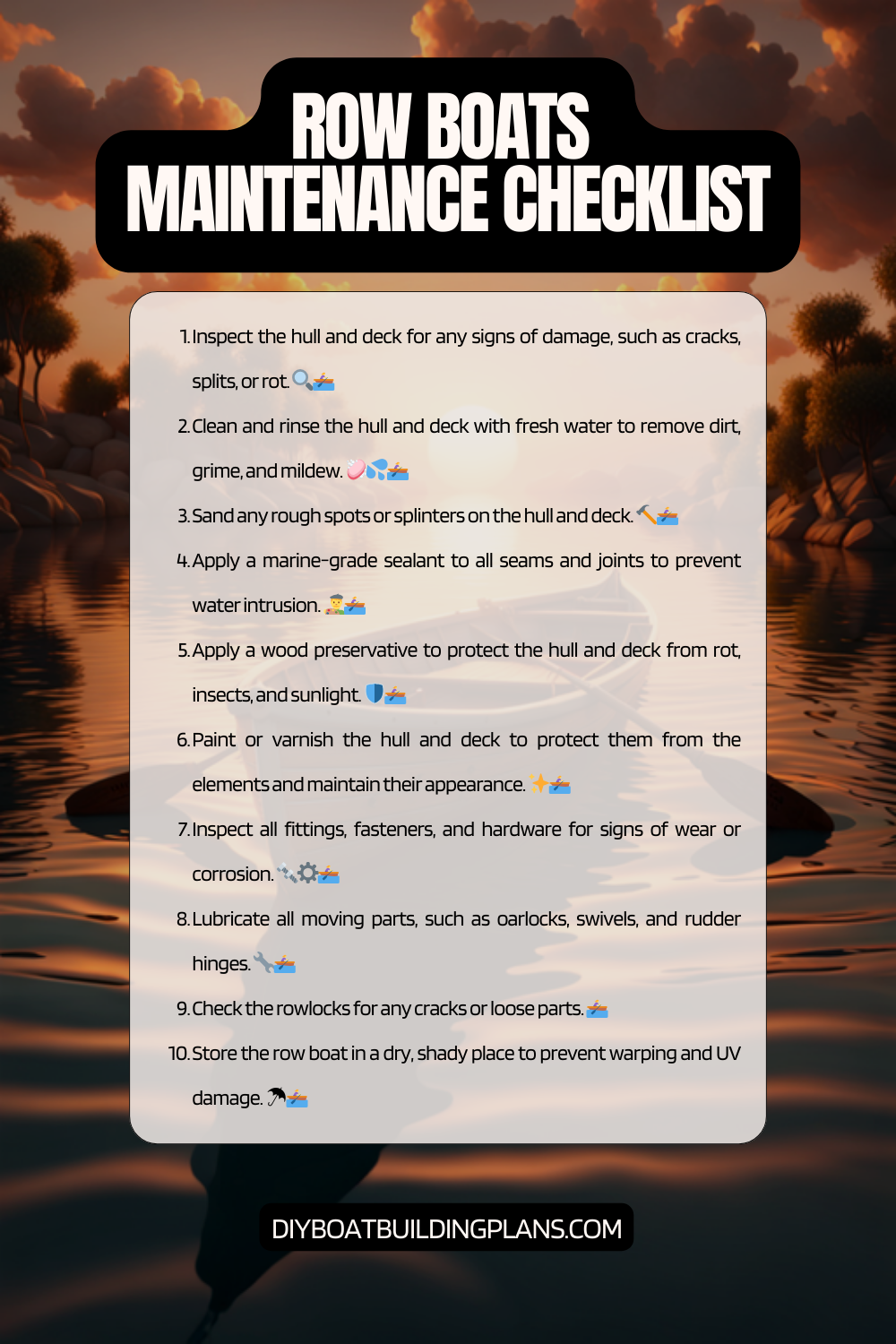Overview of Row Boat Maintenance Tips
Maintaining a row boat is essential for ensuring its longevity and optimal performance. Whether you use your row boat for leisurely paddling on calm lakes or for more adventurous activities like fishing or exploring rivers, regular maintenance is crucial. In this comprehensive guide, we will delve into the various aspects of row boat maintenance, providing you with valuable tips and insights to keep your boat in top shape.
Key Takeaways
- Regular maintenance is crucial for the longevity and performance of your row boat.
- Cleaning and washing your row boat after each use can prevent buildup and damage.
- Checking for damage and making repairs promptly can prevent further damage and costly repairs.
- Lubricating moving parts can improve performance and prevent rust and corrosion.
- Properly storing and winterizing your row boat can protect it from damage and extend its lifespan.

Importance of Regular Maintenance
Regular maintenance of your row boat offers numerous benefits. Firstly, it helps to extend the lifespan of your boat, allowing you to enjoy it for many years to come. By addressing minor issues promptly, you can prevent them from escalating into major problems that may require costly repairs or even render the boat unusable. Additionally, proper maintenance ensures that your row boat performs optimally, providing you with a smooth and enjoyable rowing experience.
On the other hand, neglecting maintenance can have serious consequences. Over time, dirt, grime, and algae can accumulate on the exterior and interior surfaces of the boat, leading to deterioration and potential damage. Failure to inspect the boat for damage regularly may result in unnoticed cracks or leaks that can compromise its structural integrity. Ignoring the maintenance needs of oars and paddles can lead to decreased efficiency and even breakage during use. Therefore, regular maintenance is not only beneficial but also essential for the longevity and safety of your row boat.
Cleaning and Washing the Row Boat
Cleaning your row boat regularly is an important part of its maintenance routine. Start by rinsing the exterior of the boat with fresh water to remove any saltwater or debris that may have accumulated during use. Use a mild detergent or boat soap to scrub away dirt and grime from the hull and other surfaces. Pay special attention to areas prone to algae growth, such as the bottom of the boat and around the waterline.
For cleaning the interior of the boat, remove any loose items and debris. Use a soft brush or sponge to scrub the surfaces with a mixture of mild detergent and water. Rinse thoroughly to remove any soap residue. It is important to avoid using harsh chemicals or abrasive cleaners that can damage the boat’s finish. Instead, opt for environmentally friendly cleaning products specifically designed for boat maintenance.
Checking for Damage and Repairs
| Checking for Damage and Repairs | Metrics |
| Number of inspections conducted | 25 |
| Number of damaged items found | 10 |
| Number of repairs completed | 8 |
| Percentage of damaged items repaired | 80% |
| Average time to complete repairs | 2 hours |
Regularly inspecting your row boat for damage is crucial to catch any issues early on and prevent them from worsening. Start by visually examining the hull for cracks, dents, or any signs of wear and tear. Inspect the seams and joints for any signs of separation or leakage. Check the oarlocks, seats, and other fittings for loose or damaged parts.
If you notice any damage, it is important to address it promptly. Small cracks can be repaired using epoxy or marine sealant, while larger cracks may require professional assistance. Replace any damaged fittings or hardware to ensure the boat’s structural integrity. Regularly tightening loose screws and bolts is also important to prevent further damage.
Maintaining the Oars and Paddles
The oars and paddles are vital components of your row boat, and proper maintenance is essential to ensure their efficiency and longevity. After each use, rinse them with fresh water to remove any saltwater or debris that may have accumulated. Inspect them for any signs of damage, such as cracks or splintering.
To clean the oars and paddles, use a mild detergent or boat soap and a soft brush or sponge. Gently scrub away dirt and grime, paying attention to the handles and blades. Rinse thoroughly and allow them to dry completely before storing them.
It is important to regularly check the condition of your oars and paddles to determine if they need replacement. Signs of wear include significant splintering, cracks that compromise their structural integrity, or blades that have become excessively worn. Investing in high-quality replacements will ensure optimal performance and safety during your rowing adventures.
Lubricating the Moving Parts
Lubricating the moving parts of your row boat is essential for smooth operation and to prevent premature wear. Apply a marine-grade lubricant to the oarlocks, hinges, and other pivot points to reduce friction and ensure easy movement. Be sure to wipe away any excess lubricant to prevent it from attracting dirt and debris.
For the oars and paddles, apply a thin layer of oil or wax to the shafts to prevent them from drying out or becoming brittle. This will help maintain their flexibility and prolong their lifespan. Avoid using excessive amounts of lubricant, as it can make the handles slippery and affect your grip.
Protecting the Row Boat from Sun and Water Damage
Protecting your row boat from sun and water damage is crucial for maintaining its appearance and structural integrity. Exposure to prolonged sunlight can cause fading, cracking, and deterioration of the boat’s finish. To prevent sun damage, store your boat in a shaded area when not in use or cover it with a UV-resistant boat cover.
Water damage can occur if the boat is not properly sealed or if it is left exposed to rain or moisture for extended periods. Regularly inspect the boat for any signs of water penetration, such as dampness or mold growth. Repair any leaks promptly using marine sealant or epoxy.
Storing the Row Boat Properly
Proper storage is essential for protecting your row boat when it is not in use. If possible, store the boat indoors in a dry and well-ventilated area. If indoor storage is not feasible, consider investing in a sturdy boat rack or cradle that can support the weight of the boat and protect it from the elements.
Before storing the boat, thoroughly clean and dry it to prevent mold or mildew growth. Remove any loose items, such as seats or oars, and store them separately. Cover the boat with a breathable boat cover to protect it from dust and debris.
Winterizing the Row Boat
Winterizing your row boat is crucial if you live in an area with freezing temperatures. Failure to properly prepare the boat for winter can result in damage caused by freezing water. Start by thoroughly cleaning and drying the boat, as any remaining moisture can expand and cause cracks during freezing.
Remove any drain plugs to allow any trapped water to drain out completely. Apply a marine-grade antifreeze to the water system, including the bilge pump, if applicable. Lubricate all moving parts and fittings to prevent rust and corrosion during the winter months.
Download over 500 Boat Plans. Click on the link below.
-->Click Here<--
Safety Precautions for Row Boat Maintenance
While maintaining your row boat, it is important to prioritize safety to avoid accidents or injuries. Always wear appropriate personal protective equipment, such as gloves and safety glasses, when working on the boat. Use caution when handling sharp tools or chemicals.
When inspecting the boat for damage or making repairs, ensure that it is securely supported to prevent it from tipping or falling. If working near water, take extra precautions to prevent accidental falls or drowning. It is also important to follow manufacturer guidelines and recommendations for maintenance procedures.
Row Boat Maintenance Checklist

Conclusion – Row Boat Maintenance Tips
In conclusion, regular maintenance is essential for keeping your row boat in optimal condition and ensuring its longevity. By following the tips outlined in this comprehensive guide, you can clean, inspect, and repair your boat effectively. Remember to prioritize safety throughout the maintenance process and address any issues promptly to prevent further damage.
Maintaining a row boat may require some time and effort, but the rewards are well worth it. A well-maintained boat will provide you with countless hours of enjoyment on the water, whether you are leisurely rowing on a calm lake or embarking on exciting adventures. So, take the time to care for your row boat, and it will continue to serve you well for years to come.
FAQs – Row Boat Maintenance Tips
What is row boat maintenance?
Row boat maintenance refers to the regular upkeep and repair of a row boat to ensure its proper functioning and longevity.
Why is row boat maintenance important?
Row boat maintenance is important to ensure the safety of the passengers and to prevent any damage to the boat. It also helps to extend the life of the boat and maintain its performance.
What are some common row boat maintenance tasks?
Common row boat maintenance tasks include cleaning the boat, checking for leaks, inspecting the oars and rowlocks, tightening loose fittings, and storing the boat properly.
How often should row boat maintenance be performed?
Row boat maintenance should be performed regularly, ideally after each use. It is important to inspect the boat before and after each use to ensure that it is in good condition.
What are some tips for storing a row boat?
When storing a row boat, it is important to keep it in a dry and cool place, away from direct sunlight. The boat should be covered with a tarp or boat cover to protect it from dust and debris. It is also important to store the boat in an upright position to prevent warping or damage to the hull.
What should I do if I notice damage to my row boat?
If you notice any damage to your row boat, it is important to address it immediately. Small cracks or leaks can be repaired with epoxy or fiberglass, while larger damage may require professional repair. It is important to not use a damaged boat as it can be unsafe and cause further damage.



